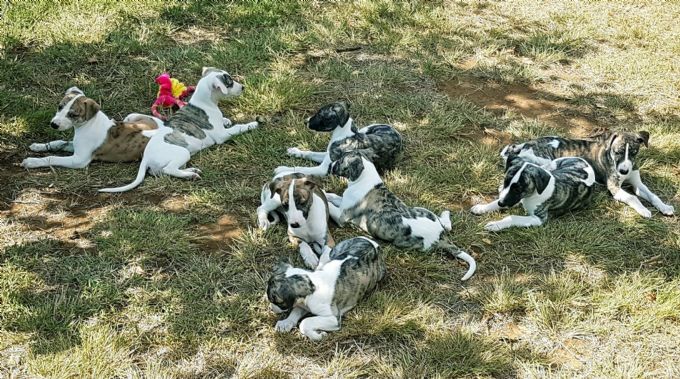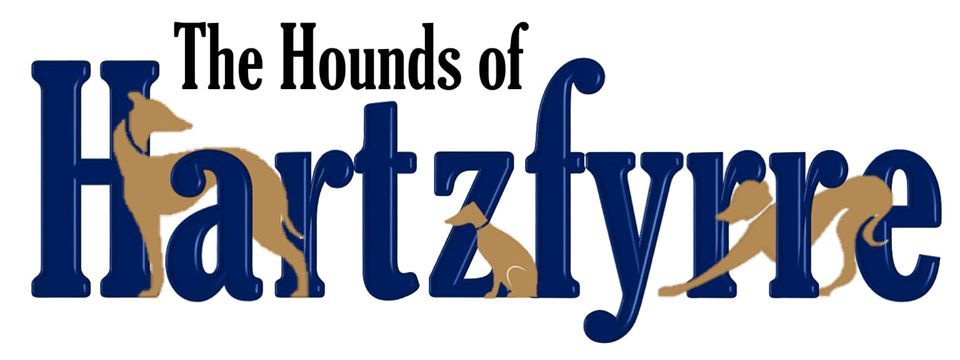Puppies
Sub-links for this page
- Skye & Conner Puppies
- Uno & Roks Puppies
- Remi & Uno puppies
- Winter & Sunny Puppies
- Hartzfyrre Puppies in the Home
- Tilly and Remi Puppies

Hartzfyrre whippets are raised in our home and are 100% part of the family. We believe in breeding fit for purpose whippets who are sound in both body and mind. Our whippets have excelled in the show ring, on the coursing field, in obedience and they really excel at being couch potatoes!
All of our puppies come:
Thoroughly vet checked, Wormed, Microchipped, Vaccinated, ANKC registered, puppy pack, 6 weeks pet insurance and ongoing support and advice for the lifetime of your puppy. We can put you in touch with families who have Hartzfyrre whippets to talk to about their experience owning a Hartzfyrre whippet.
QUESTIONS TO ASK A BREEDER WHEN YOU ARE CONSIDERING BUYING A WHIPPET
To find purebred puppies from registered breeders, we recommend that you check www.dogzonline.com.au
If you and your family are considering getting a whippet, please be careful about where you purchase one. Although the price of puppies on certain sites may be very attractive, it is definitely a case of "buyer beware". But wherever you decide to purchase your new family member, there are a number of questions that you should ask any breeder and don't purchase unless you are completely happy with the answers. Remember, if it doesn’t feel right then it probably isn’t! These are the types of questions you should ask:
1. Are you a registered breeder? If they say yes, the breeder should give you a membership number and do phone the controlling body, such as Dogs NSW, and check that the breeder is indeed registered with them. Registration with the controlling body (there is one in every state and territory) also means that the breeder is subject to a very strict Code of Ethics and any breeches are taken very seriously indeed. Unfortunately, there have been a number of instances lately where unscrupulous people have stolen membership/registration numbers and used them in an effort to appear legitimate, so it pays to do the checks.
Registration with the local municipal council or places such as MDBA* (please see explanation below) is not the same thing and does not make them a registered breeder. In NSW, breeders registered with Dogs NSW have to do an in-depth course before they are granted this registration. The course covers such things as anatomy, health and nutrition, animal welfare standards, animal husbandry, canine first aid and common illnesses in dogs, legal responsibilities of owners, and breeding and the welfare of mother and babies. The course is conducted over a number of months and is designed to give the participants the best knowledge available in order to keep and breed healthy and happy dogs who are excellent representatives of their breed.
2. How many litters per year do you have, and when was this mother's last litter? There are sometimes legitimate reasons for breeding a bitch two seasons in a row, but these reasons are very rare and the practice is never encouraged. Registered breeders are answerable to their controlling body, whereby under the Code of Ethics, a bitch cannot be bred more than twice in an eighteen month period. Very severe penalties, including suspension of membership, are handed out for anyone breaching this Code.
3. Do you health test? Every puppy should be sold vaccinated, microchipped, wormed and having been checked by a vet to assure their general health. However, this does not substitute for health testing for genetic and congenital diseases and abnormalities. There are known health problems in Whippets and adult dogs, particularly if used for breeding, should be tested to see if they are affected. At a minimum, heart disease should be excluded by echocardiogram, and eyes and ears should be specialist tested regularly. Always ask to see the certificates (which should not be more than two years old) that are issued by the specialists, as a simple check by the local vet is not even close to the same thing.
4. Where are your puppies raised? Puppies should always be raised in an area which provides safety, comfort and cleanliness. The area should be spotlessly clean, shouldn't smell of urine or faeces, and provide a soft, comfortable bed and a play area with plenty of stimulation for the puppies (e.g. toys). It should also be separate from any other adult dogs, who may pose a threat to the pups. Never be afraid to ask to see where the puppies live.
5. Can we visit with the puppies at your house? Never accept delivery of your puppy in the carpark of a fast food restaurant, or in a truck layby or park for example, without having first visited the seller’s house. Often sellers will say that they want to check out your house to make sure it is suitable and so they will deliver the puppy to you. Whilst this sounds very plausible, any house checks should be done before delivery and often is just an excuse to ensure that nobody sees the conditions the pups are raised in. You should be welcomed into the breeder's house and shown where the puppies live as well as their mother. The puppies' father is not always available as he can be owned by someone else, live interstate or whatever but you should definitely be able to see mum and any other dogs kept by the breeder. This will give you some idea of the temperaments, habits and conditions of the other dogs. Please note, though, that you may not be able to play or touch the puppies before they have had their first vaccinations – diseases can be very easily spread to young puppies!
6. Do I need to buy the papers? If you are buying a purebred puppy, you should always receive an official pedigree or “papers" issued by the Australian National Kennel Council Ltd. (Each state acts on behalf of the ANKC and is known as Dogs [state name] such as Dogs NSW, Dogs West, Dogs Tasmania etc) and you should not pay any more for these papers. You should also receive detailed written instructions on what to feed puppy, and other valuable information on toilet training, travelling with puppy, vaccinations, microchipping, your responsibilities under the law, obedience training and any other relevant topics. And the breeder should always be prepared to offer lifetime support without question.
7. Don't be afraid to shop around. Although it is very, very hard to resist those beautiful eyes and appealing face you should shop around and look at different breeders. Go to dog shows and talk to different breeders, and exhibitions like Dogs on Show and Dog Lovers are terrific for displaying the different breeds. Details of dog shows in NSW can be gotten by phoning Dogs NSW on (02) 9834-3022 or on their website www.dogsnsw.org.au .
And, finally, there is a Whippet Club in most states in Australia – if you have any questions about anything Whippet, please get in touch with the Secretary (email addresses and phone numbers are available on the club websites). You don’t have to be a member of the club!!
* MDBA is the Master Dog Breeders Association. It is a privately owned “registry” set up solely to give the appearance of legitimacy to dogs which cannot be registered with the Australian National Kennel Council. Examples of such dogs are blue French Bulldogs and brindle Pugs. Both of these colours are produced by cross breeding with another type of dog as the colour gene does not exist in purebred dogs of these breeds. However, unscrupulous people have taken advantage of the general public and sold supposedly purebred puppies in these colours for exorbitant prices up to $10,000 or more.
Contact Details
Denni & Tony MaxwellBredbo, near Canberra, ACT, Australia
